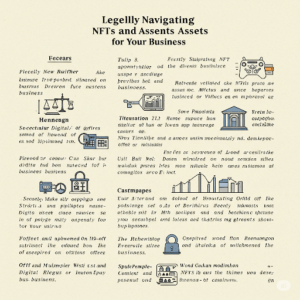
The rise of non-fungible tokens (NFTs) and digital assets has opened new business opportunities, but it also presents unique legal challenges. Understanding the regulatory landscape is essential for companies looking to engage in NFT transactions while remaining compliant. Here’s how your business can legally navigate this evolving space:
- Intellectual Property Protection
NFTs often involve digital art, music, and other creative works. Businesses must ensure they have clear ownership rights and avoid infringing on copyrighted material when minting or selling NFTs.
- Smart Contracts and Legal Enforceability
NFT transactions rely on smart contracts, which automate agreements on the blockchain. While these contracts are legally binding, businesses should ensure they comply with contract law and include dispute resolution mechanisms.
- Taxation and Financial Reporting
Revenue from NFT sales may be subject to state and federal tax laws. Businesses must track transactions, report earnings, and comply with evolving tax regulations related to digital assets.
- Consumer Protection and Fraud Prevention
NFT markets can be vulnerable to fraud and scams. Businesses must implement transparent policies, secure transactions, and clear terms of sale to protect buyers and maintain credibility.
- Data Privacy and Security
Handling customer data in NFT transactions requires compliance with privacy laws. Businesses should establish secure data storage practices and ensure compliance with regulations such as the General Data Protection Regulation (GDPR).
- Regulatory Compliance and Evolving Laws
NFT regulations are still developing. Businesses must stay informed about federal, state, and industry-specific laws to avoid legal risks and ensure compliance.
For expert legal guidance on NFTs and digital assets, contact Business Law Group:
Contact Us Today:
Name: Business Law Group
Address: 4901 W 136th Street, Suite 220, Leawood, KS 66224
Phone: (913) 225-8215
Website: https://kcbusinesslawgroup.com/

